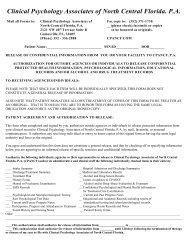Anxiety Disorders - Clinical Psychology Associates of North Central ...
Anxiety Disorders - Clinical Psychology Associates of North Central ...
Anxiety Disorders - Clinical Psychology Associates of North Central ...
You also want an ePaper? Increase the reach of your titles
YUMPU automatically turns print PDFs into web optimized ePapers that Google loves.
<strong>Clinical</strong> <strong>Psychology</strong> <strong>Associates</strong> <strong>of</strong> <strong>North</strong> <strong>Central</strong> FloridaQuick Reference Guide To:<strong>Anxiety</strong> <strong>Disorders</strong>by Amanda Ross, M.A., <strong>Psychology</strong> Intern<strong>Anxiety</strong> disorders are treatable illnesses that bring on feelings <strong>of</strong> overwhelming fear that is strong enough toaffect everyday life. In the United States, about 40 million adults (18% <strong>of</strong> the population) are affected byanxiety disorders every year. <strong>Anxiety</strong> disorders are not the same as the brief worry that goes along with astressful event, like a test or first date. <strong>Anxiety</strong> disorders last at least 6 months and may get worse if nottreated. <strong>Anxiety</strong> disorders affect the mind, body, and behavior and can cause difficulty at work, school, and inrelationships with family and friends.Common <strong>Anxiety</strong> Symptoms• Worry or fear thatsomething bad mighthappen• Trembling, twitching, orfeeling shaky• Fatigue or restlessness• Muscle tension or jitteriness• Feeling dizzy or lightheaded• Fast heartbeat or breathingrate• Sweating, cold, or clammyhands• Dry mouth, nausea, ordiarrhea• Irritability, impatience,easily distracted• Difficulty swallowing• Memory problems• Hot or cold flashesThe National Institute <strong>of</strong> Mental Health described five common types <strong>of</strong>anxiety disorders:• Generalized <strong>Anxiety</strong> Disorder (GAD): Excessive anxietyand worry, along with other physical and behavioralproblems, that lasts for at least six months• Social Phobia (commonly referred to as Social <strong>Anxiety</strong>Disorder): A constant fear <strong>of</strong> situations in which aperson may be exposed to possible judgment fromothers• Panic Disorder: A sudden, uncontrollable attack <strong>of</strong>terror that can show itself as racing heartbeat, dizziness,shortness <strong>of</strong> breath, and a feeling <strong>of</strong> being terriblyfrightened or out <strong>of</strong> control• Obsessive Compulsive Disorder (OCD): Repeated,interfering and unwanted thoughts that cause anxiety,and is <strong>of</strong>ten combined with ritualized behavior thatrelieves the anxiety• Post-Traumatic Stress Disorder: Caused when someoneexperiences an extremely distressing or traumatic event.Common symptoms are recurring nightmares,flashbacks, and unprovoked anger.Assessment should begin with a medical evaluation to rule outphysiological causes <strong>of</strong> excessive anxiety such as thyroid or othermetabolic or medical conditions. Left untreated anxiety disorders canbecome worse with time and can wear down coping skills, resulting in asecondary major depressive disorder. Maladaptive attempts toself-medicate can result in alcohol or substance abuse and dependence,which usually make anxiety symptoms worse. In some cases <strong>of</strong> panicdisorder, development <strong>of</strong> pr<strong>of</strong>ound avoidance (agoraphobia) can developand interfere greatly with daily functioning.
FAQ: What Causes <strong>Anxiety</strong> <strong>Disorders</strong>?<strong>Anxiety</strong> Disorder Frequently Asked Questions (FAQs)Genetics, biochemistry, environment, and a person’s psychological pr<strong>of</strong>ile seem to contribute to thedevelopment <strong>of</strong> an anxiety disorder. Typically, a thorough examination is performed to verify the cause <strong>of</strong> theanxiety before treatment can begin. It is not unusual for anxiety to be misdiagnosed. If anxiety is caused bya medication or substance abuse, then it is not considered an anxiety disorder. The National Institute <strong>of</strong>Mental Health reports that most anxiety disorders are accompanied by other health problems such asdepression, substance abuse, eating disorders, or other mental illness.FAQ: How are <strong>Anxiety</strong> <strong>Disorders</strong> Treated?<strong>Anxiety</strong> disorders are treated in many ways, but the most effective forms <strong>of</strong> treatment arecognitive-behavioral therapy, medication, or a combination <strong>of</strong> both. Treatment options depend on eachperson’s situation and preferences. Cognitive-behavioral therapy teaches several techniques to stopunwanted thoughts and behaviors. Some <strong>of</strong> these techniques are deep breathing exercises and changingthinking patterns. Exposure therapy is also effective and it encourages patients to gradually face a fearedsituation with the intention <strong>of</strong> overcoming fears.FAQ: What about medication for anxiety disorder?Medication is prescribed when symptoms <strong>of</strong> anxiety cause problems in everyday life. It is also important tonote that many patients can reduce or discontinue psychiatric medication with a course <strong>of</strong> effectivepsychotherapy for anxiety. Group therapy, hypnotherapy, and self-help support groups can also be effective.If a person experiences anxiety for longer than 6 weeks, a mental health pr<strong>of</strong>essional should be consulted.If you feel you might have an anxiety disorder and wish to schedule an appointment for an initial assessmentor treatment, call <strong>Clinical</strong> <strong>Psychology</strong> <strong>Associates</strong> <strong>of</strong> <strong>North</strong> <strong>Central</strong> Florida and find out how we can help.Related Articles:Social <strong>Anxiety</strong> Disorder: Definitions and ManifestationsOvercoming Social <strong>Anxiety</strong> DisorderCommon Childhood FearsPost-Partum Depressive <strong>Disorders</strong>Chronic Pain DisorderCoping with CancerWebsite: http://cpancf.comAppointments: (352) 336-2888Providing Quality Psychological Consultation, Assessment, and Treatment to the <strong>North</strong> <strong>Central</strong> Florida Community









